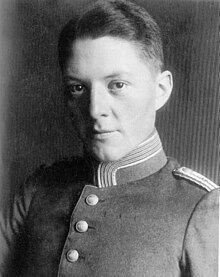Werner Otto von Hentig
Surviving diary accounts of participants on both sides of the Great War bear witness to the unusual camaraderie and esprit de corps summoned by Hentig's outstanding qualities of leadership.During the First World War he was wounded in the Battle of the Masurian Lakes, then later in 1915, with Oskar Niedermayer, led the Niedermayer–Hentig Expedition, a German mission to Kabul that sought to enlist the Afghan Amir's support for the Central Powers and an attack on British India.Although Eichmann had wanted the training and emigration to be handled by the Gestapo, Auerbach found confederates[a] who used the opportunity to obtain 20,000 transit visas that could theoretically enable Jewish migration to Yugoslavia.Although the actual numbers saved from later being sent to concentration camps were fewer than 20,000, various efforts enabled many small groups in bunches of hundreds to find passage on several different vessels departing Yugoslav and Grecian ports.Whereas Grobba, an ardent Nazi, belonged in both world wars to the Foreign Office faction that favoured the massive incitement of Muslims to jihad in the British and French colonial empires and the Soviet Union, Hentig and Niedermayer rejected it.In 1961, Hentig, along with Bogislaw von Bonin, Herman Schwann, Wolf Schenke, and Theodor Kogler, was one of the founders of the Association of German National Assembly.
LindesnesdiplomatGreat GameGreat Waresprit de corpscriminal psychologistHans von HentigThird ReichImperial GermanIstanbulTehranBattle of the Masurian LakesOskar NiedermayerNiedermayer–Hentig ExpeditionAfghan AmirCentral PowersBritish IndiaSiberiaPoznańGerman Youth MovementSan FranciscoBogotáMandatory PalestineWilhelmstrasseChaim WeizmannHaavaraMossadEichmannGestapoKristallnachtErnst von WeizsäckerWolfgang G. SchwanitzDr Fritz GrobbaBritishFrench colonial empiresSoviet UnionBeirutForeign OfficeEinsatzgruppe DIndonesiaSaudi Royal FamilyBogislaw von BoninBayerischer RundfunkHopkirk, PeterHindu–German ConspiracyIndian independence movementmilitantShyamji Krishna VarmaBhikaiji CamaIndia HouseAnushilan SamitiJugantarAlipore Bomb CaseDelhi ConspiracyHardayalSohan SinghPandurang KhankhojeHindustan GhadarGhadar di gunjGhadar MovementTarak NathGuran DittBaba Gurdit SinghKomagata MaruBhagwan SinghBhai ParmanandRam ChandraKartar SinghVishnu PingleKanshi RamAgnes SmedleyBerlin CommitteeChattoChampakA. R. PillaiM. P. T. AcharyaBarkatullahBhupendranath DattaAbhinash BhattacharyaMahendra PratapHerambalal GuptaBagha JatinRash BehariSachin SanyalBhavabhushan MitraM. N. RoyPritam SinghAmarendranath ChatterjeeAtulkrishna GhoshDeobandiMahmud al-HasanUbaidullah SindhiMuhammad Mian Mansoor AnsariSufi Amba PrasadTheobald von Bethmann HollwegZimmermannIntelligence Bureau for the EastMax von Oppenheimvon BernstorffGeorge RodiekNiedermayerAnnie LarsenSS MaverickFebruary plotSingapore mutinyLahore Conspiracy Case trialChristmas Day PlotSilk Letter ConspiracyKabul MissionProvisional Government of IndiaHindu–German Conspiracy TrialCounter-intelligenceW. C. HopkinsonJohn WallingerIndian Political IntelligenceBasil ThomsonMI5(g)Vernon KellRobert NathanKirpal SinghVincent KraftWilliam WisemanCharles TegartGuy GauntW. Somerset MaughamEast Persia Cordon